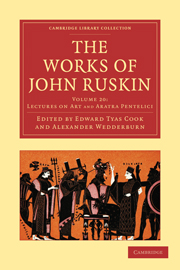Book contents
- Frontmatter
- Contents
- LIST OF ILLUSTRATIONS
- INTRODUCTION TO THIS VOLUME
- LIST OF RUSKIN'S OXFORD LECTURES DURING HIS FIRST TENURE OF THE SLADE PROFESSORSHIP (1870—1878)
- PART I “LECTURES ON ART” (INAUGURAL COURSE DELIVERED AT OXFORD IN HILARY TERM, 1870)
- PART II “ARATRA PENTELICI” (SIX LECTURES ON THE ELEMENTS OF SCULPTURE, DELIVERED AT OXFORD IN MICHAELMAS TERM, 1870)
- APPENDIX: LECTURES AND NOTES FOR LECTURES ON GREEK ART AND MYTHOLOGY (1870)
- I “THE STORY OF ARACHNE”: A LECTURE DELIVERED AT WOOLWICH, DECEMBER 13, 1870
- II “THE TORTOISE OF AEGINA”: AN UNDELIVERED LECTURE IN CONTINUATION OF “ARATRA PENTELICI”
- III “THE RIDERS OF TARENTUM”
- IV “THE EAGLE OF ELIS”
- V GREEK AND CHRISTIAN ART: AS AFFECTED BY THE IDEA OF IMMORTALITY
- VI SOME CHARACTERISTICS OF GREEK ART IN RELATION TO CHRISTIAN
- Plate section
I - “THE STORY OF ARACHNE”: A LECTURE DELIVERED AT WOOLWICH, DECEMBER 13, 1870
Published online by Cambridge University Press: 07 September 2011
- Frontmatter
- Contents
- LIST OF ILLUSTRATIONS
- INTRODUCTION TO THIS VOLUME
- LIST OF RUSKIN'S OXFORD LECTURES DURING HIS FIRST TENURE OF THE SLADE PROFESSORSHIP (1870—1878)
- PART I “LECTURES ON ART” (INAUGURAL COURSE DELIVERED AT OXFORD IN HILARY TERM, 1870)
- PART II “ARATRA PENTELICI” (SIX LECTURES ON THE ELEMENTS OF SCULPTURE, DELIVERED AT OXFORD IN MICHAELMAS TERM, 1870)
- APPENDIX: LECTURES AND NOTES FOR LECTURES ON GREEK ART AND MYTHOLOGY (1870)
- I “THE STORY OF ARACHNE”: A LECTURE DELIVERED AT WOOLWICH, DECEMBER 13, 1870
- II “THE TORTOISE OF AEGINA”: AN UNDELIVERED LECTURE IN CONTINUATION OF “ARATRA PENTELICI”
- III “THE RIDERS OF TARENTUM”
- IV “THE EAGLE OF ELIS”
- V GREEK AND CHRISTIAN ART: AS AFFECTED BY THE IDEA OF IMMORTALITY
- VI SOME CHARACTERISTICS OF GREEK ART IN RELATION TO CHRISTIAN
- Plate section
Summary
[1. After apologising for the hasty preparation of his Address, Professor Ruskin went on to speak rather to those who had not succeeded in gaining prizes than to those who had succeeded; urging that to be undistinguished was the lot, though not necessarily the misfortune, of many. At that moment, every one had set his heart on Education, and it seemed to be taken that any education was better than none. But no education was not always the worst of things, for one of the best companions he had ever met was a Savoyard peasant who could neither read nor write, but who was an entertaining talker and a practical philosopher. A good education was usually supposed to comprehend reading, writing, arithmetic, geography, geology, astronomy, Latin, Greek, and other languages:—and after this, all that was to be done was to grow rich and happy. He knew something of most of these things, but they did not constitute his happiness; for the geologists disputed his theories, and he was miserable about the smallness of his collection of specimens. When he was a boy, and for the first time received the present of a colour-box, he was delighted with all that he did with it. “You don't suppose,’ he continued, “getting a colour-box is any pleasure to me now. I'm ashamed to spoil the look of the paints, for fear I shouldn't make a good picture out of them.”]
- Type
- Chapter
- Information
- The Works of John Ruskin , pp. 371 - 380Publisher: Cambridge University PressPrint publication year: 2010First published in: 1905

